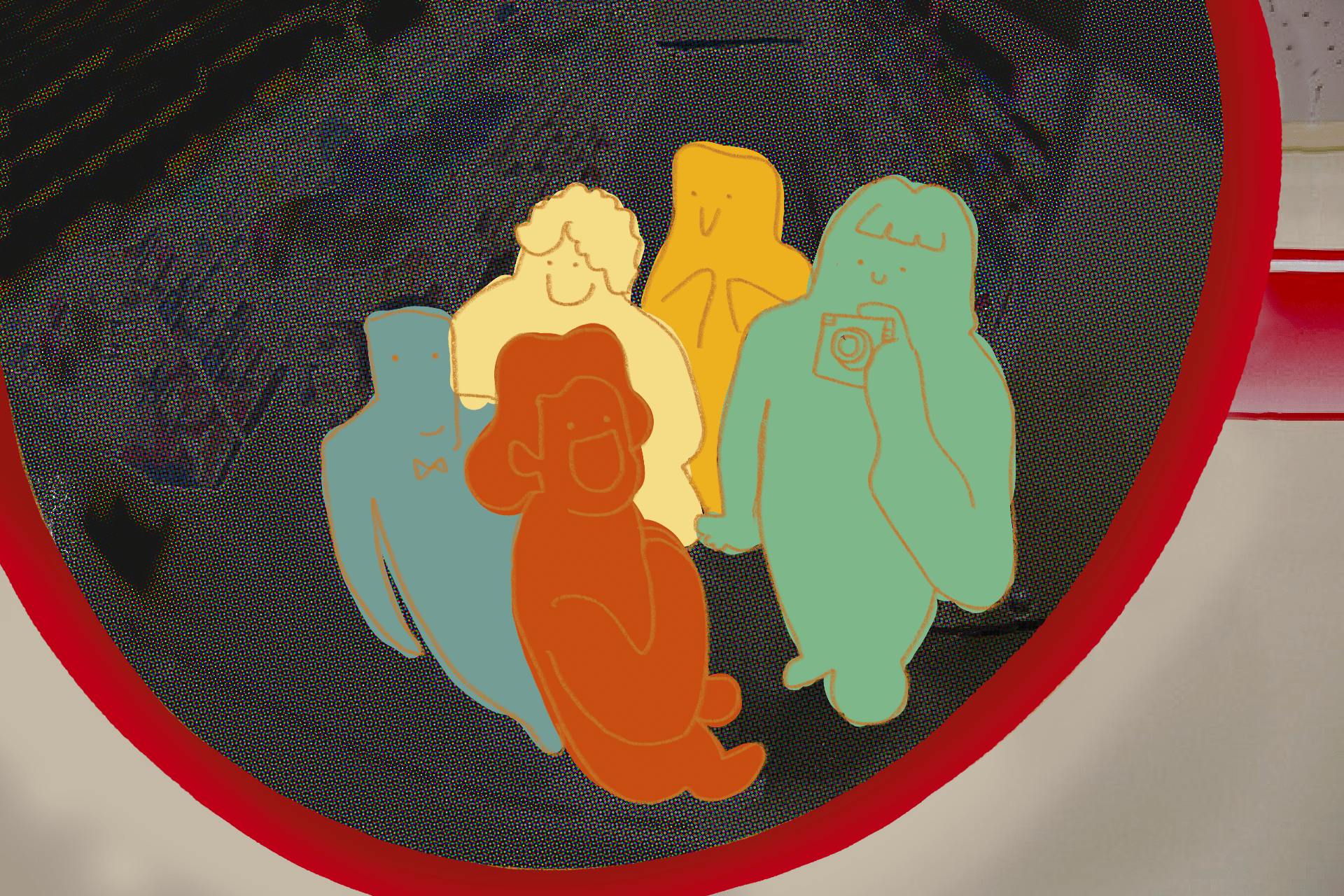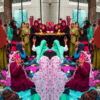In March of this year, Singaporean activist Jolovan Wham stood in front of a police station, holding up a cardboard sign with a smiley face. He was exposing and challenging the criminalization of free speech and the freedom of assembly in Singapore, while demonstrating support for the two climate justice activists from Fridays for Future in Singapore, who faced police investigation for holding up signs in protest of the city’s reliance on fossil fuels. Wham was standing at the exact same spot where one of the youth activists was.
Shortly after, Wham started Smile in Solidarity, an online campaign, to raise awareness of Singapore’s lack of civil liberties. The campaign received support from Singaporeans and others abroad who articulated why they value free speech. Wham previously shared his views about the campaign with Lausan.
Since then, Wham has been formally charged with illegal assembly and with contravening the Public Order Act for a similar act of protest in 2018, where he held up a sign outside of the State Courts Building in support of journalists who were charged with defaming high-ranking officials. Wham spoke with Lausan editor Sharon Yam to discuss the state of activism in Singapore, and whether there are any transferable lessons or room for transnational solidarity between Singapore and other grassroots movements in the region.
Civil society and grassroots activism in Singapore
SY: You’ve been formally charged for holding up a picture of a smiley face. News of this sent shockwaves around the world—it’s been reported on by the New York Times, BBC, among other major outlets. Can you tell us more about the state of grassroots activism in Singapore’s civil society since then?
JW: Since the time I was investigated until now, we’ve had a General Election where the opposition made gains by winning more seats. This is a positive development. I can sense more hope and optimism among Singaporeans that the ruling party’s grip on power isn’t as strong as before. The usual tactics of bullying and character assassination of opposition politicians by the ruling party did not gain much traction among voters. This bodes well for our democratic development. We are making small but significant gains.
The climate justice movement is also growing: climate activists are organizing themselves and not just speaking out about the environment, but other social issues as well. We’re seeing a more intersectional approach to things, which is very encouraging. Overall, more individuals are also speaking against institutional power. We can see that happening in universities where there has been a rise in the number of individuals claiming sexual abuse and harassment.
However, the government is still cracking down on civil society. Since we last spoke, more activists and citizens have been harassed by the police for online activism. An opposition member of the parliament was investigated and issued a warning letter by the police for comments she made about racism in Singapore. This year, two citizen journalists appeared in court for ‘criminal defamation’ which were filed against them two years ago. Two bloggers are also being sued for defaming the Prime Minister. One of them had only re-shared a Facebook post without adding any commentary. Despite this crackdown, the internet continues to be an empowering space for many Singaporeans. This is why the government is anxious to rein in dissenting voices with their usual punitive tactics. They hope that by doing so, they will continue to instill fear among Singaporeans.
There is still a very strong “cooperate, don’t confront” ethos in Singaporean civil society and civic discourse. In Singapore, confrontational activism usually means writing a petition, or issuing a critical statement. Even then, activists need to make sure that statements are carefully and moderately worded so they don’t invite backlash and reprisals from the government. Critics must appear “balanced” in their commentary and activism so they are not perceived by the government as having an “agenda.”
Therefore, open confrontation is still seen as “unproductive” and unstrategic because it will not gain widespread support. But open confrontation is necessary if we don’t want to normalize state-endorsed activism—after all, state-endorsed activism will never shift the balance of power. Acceptable, state-endorsed forms of activism are based out of fear, and the absence of open confrontation in activism only masks and sweeps under the rug the authoritarian control the state and the ruling party have over us. This needs to be challenged, instead of making appeals to those in power to be more “understanding,” which seems to be the favored approach. It is a cliché but it’s true: power concedes nothing without a demand.
There is also a general perception in Singapore that one should seek change within institutional channels. If you’re not happy with a law or policy, join an opposition party, be a Nominated Member of Parliament (NMP) or even join the ruling party, and change the law through parliamentary means. But this robs communities of their power. Democracy is not just about elections and parliamentary processes, which in Singapore, is already rigged through an extremely unlevel playing field. Moreover, by the time opposition parties gain enough power to challenge the status quo, there is no guarantee that they will actually want to do so. Members of any community should be empowered to seek change outside of the parliament. And if we want to cultivate a robust democratic culture, we need to practice dissent in all forms, including civil disobedience.
SY: In your last interview with Lausan, you mentioned that you and other activists who advocated for civil and political freedoms were cast as troublemakers, and alienated by “good activists” and nonprofits. How has your community and social network shifted as your trial continues?
JW: I think my court cases have caused a minor stir among Singaporeans and brought attention to our lack of democratic freedoms. Since the Smile in Solidarity campaign started, I have received over 250 smileys from Singaporeans who are concerned about the lack of freedom of expression. What is interesting is that I see more support from those of my generation and younger. It’s a small start, but I hope it contributes to the process of our country’s democratic awakening and makes citizens realize that we need to reclaim our civic and political spaces and not have them dictated to us by the state.
Activism under state suppression: Singapore and Hong Kong
SY: As a diasporic Hongkonger living under the National Security Law, I understand deeply what you said about “selective disciplining” by the state, and the importance in challenging “the culture of obedience and self-censorship.” What suggestions do you have to folks who want to challenge a draconian government but have very legitimate concerns over their safety? What forms of risk assessment did you engage in when you first decided to start Smile in Solidarity?
JW: Singapore’s authoritarian conditions are less harsh than in places like China and Vietnam, so it’s a bit hard for me to give any “advice” given these different contexts. But I will talk about what worked for me. First of all, for risky activism to be sustainable, you need to look after your mental health. And this means pacing yourself, and reflecting deeply on what your threshold for risk is. One way you can find out is to take small risks incrementally, instead of plunging headlong into something and then having to reel from the shock of it after that. For example, my experience as a migrant rights activist gave me a lot of experience negotiating with the state and the restrictions it imposes on NGOs and activists. This prepared me for the risks that I am now prepared to take on.
It is also important to discuss with your family, friends and peers and get as much of their support as possible. They may not fully agree with your actions, but at the very least, some level of preparation or acceptance is necessary. I have heard stories of emotional blackmail and recrimination from family members and this can be more stressful than state retaliation itself. I spent a long time thinking deeply about what I wanted out of my activism, and whether I was prepared for the consequences. I was born into more social privilege than most: for instance, I don’t have to worry much about finances, nor do I have heavy family responsibilities. This also meant that I could take more risks than others. I also spent a lot of time in critical reflection: what was important for me was that I didn’t want my activism to be controlled by fear. Speaking and acting in accordance to one’s own truth was important for me.
SY: What connections do you see between the grassroots social movements in Hong Kong and Singapore?
JW: Hong Kong may not be a parliamentary democracy but the Hong Kong people have a strong democratic impulse, whereas Singapore is a democracy in name but lacks a democratic consciousness among its people. Hongkongers understand freedom and democracy. They have an acute sense of when their freedoms are being stifled and are prepared to resist them. Because of this, grassroots social movements which focus on democratic change are more likely to gain momentum. Whereas in Singapore, because of decades of brainwashing through national education, political persecution, and a press which does not play its role in being a check-and-balance on power, we have become numb to oppression and normalized authoritarian culture. Whenever the government introduces anti-democracy laws, most Singaporeans accept them.
Prospects for transnational solidarity
SY: We are witnessing a strong wave of transnational solidarity among East and Southeast Asian democratic movements. For instance, Thai and Hong Kong activists have been performing acts of solidarity with one another both on and offline. Recently, this solidarity has even spread to Laos. What role do you see Singapore and Smile in Solidarity playing in this pan-Asian solidarity for grassroots democratic activism?
JW: It would be great to see more conversations and collaboration among activists across borders. Some of this is happening now in Singapore. For example, the SG Climate Rally movement recently participated and co-hosted the Asia Climate Rally, which involved activists from Southeast Asia, along with people from East and South Asian countries like Japan, South Korea, Bangladesh, and Nepal. But open displays of solidarity can be risky too. The Singapore police have issued statements warning against importing “foreign politics” into the country, especially in relation to “public order” offenses. Organizing an event which involves nationals of other countries can be difficult because foreigners are fearful of having their residency in Singapore affected by their participation in such activities.
Solidarity across borders isn’t something which will take hold in Singapore so soon. In fact, political solidarity among activists within Singapore is weak, let alone transnational solidarity. We still have a lot of work to do to build social and political consciousness here in order for these kinds of connections to happen.




